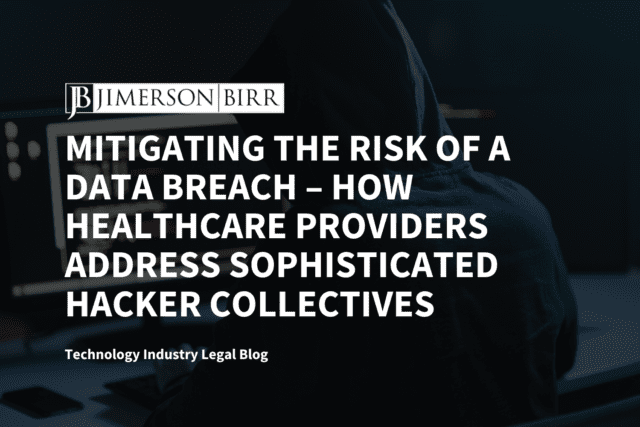How do HIPAA, HITECH and other privacy laws affect companies?
HIPAA (Health Insurance Portability and Accountability Act), HITECH (Health Information Technology for Economic and Clinical Health Act), and other privacy laws significantly affect companies in the healthcare industry and beyond. These regulations establish strict standards for the protection of individuals’ health information and impose legal obligations on covered entities and business associates to safeguard protected health information (PHI). Compliance with HIPAA, HITECH, and related privacy laws is essential for companies to maintain the trust of patients, avoid costly penalties, and mitigate the risk of reputational damage.
One of the primary ways that HIPAA, HITECH, and privacy laws compliance affect companies is through the implementation of robust data security measures. Covered entities and business associates are required to implement administrative, physical, and technical safeguards to protect the confidentiality, integrity, and availability of PHI. This includes measures such as access controls, encryption, secure transmission methods, employee training, and regular risk assessments to identify and address vulnerabilities in the handling of PHI. Failure to adequately protect PHI can result in data breaches, financial penalties, and regulatory sanctions, highlighting the importance of compliance efforts in safeguarding sensitive health information.
Patients expect healthcare organizations and other entities handling their health information to prioritize privacy and security, and failure to do so can erode trust and damage the company’s reputation. Data breaches or privacy violations can result in negative publicity, loss of business, and diminished patient confidence in the organization’s ability to protect their sensitive information. Therefore, companies must prioritize compliance efforts not only to meet regulatory requirements but also to uphold their ethical obligations to patients and maintain their reputation as trustworthy custodians of health information.
Need help regarding healthcare, including HIPAA, HITECH and privacy laws compliance? Schedule your consultation today with a top healthcare attorney.
In Florida, which privacy laws and regulations apply to healthcare companies?
- Federal HIPAA Privacy and Security Rules: The HIPAA Privacy Rule establishes national standards for the protection of PHI held by covered entities, including healthcare providers, health plans, and healthcare clearinghouses. The HIPAA Security Rule sets standards for safeguarding electronic PHI (ePHI) and requires covered entities to implement administrative, physical, and technical safeguards to protect the confidentiality, integrity, and availability of ePHI.
- HITECH Act: The HITECH Act, enacted as part of the American Recovery and Reinvestment Act of 2009, strengthened HIPAA’s privacy and security provisions and expanded its scope to include business associates of covered entities. HITECH introduced new requirements for breach notification, increased penalties for HIPAA violations, and promoted the adoption of electronic health records (EHRs) and health information exchange (HIE) technologies.
- Florida Information Protection Act (FIPA): FIPA is Florida’s data breach notification law, which requires entities to notify individuals and the Florida Department of Legal Affairs in the event of a breach of security involving personal information, including PHI. FIPA imposes notification requirements, timeframes, and penalties for failure to comply with breach notification obligations.
- Florida Statutes, Chapter 395: Florida’s healthcare facility licensing laws contain provisions related to patient privacy and confidentiality. Chapter 395 of the Florida Statutes includes requirements for maintaining patient records, protecting patient information, and ensuring the confidentiality of medical records in healthcare facilities licensed by the state.
What are common issues regarding HIPAA, HITECH and other privacy laws that lead to litigation?
Several common issues regarding HIPAA, HITECH, and privacy laws compliance can lead to litigation. These issues often stem from failures to adequately protect PHI, comply with regulatory requirements, or respond appropriately to data breaches. Here are some of the common issues:
- Data Breaches: Data breaches involving unauthorized access, use, or disclosure of PHI are a significant concern for healthcare organizations. Failure to implement adequate safeguards to protect PHI, such as encryption, access controls, and employee training, can result in data breaches. Litigation may arise from data breaches if affected individuals suffer harm or damages as a result of the breach.
- Improper Disclosure of PHI: Healthcare organizations may face litigation for improper disclosure of PHI, such as sharing patient information with unauthorized individuals or entities. This can occur due to employee negligence, lack of training, or failure to follow established policies and procedures for handling PHI. Litigation may result from violations of patient privacy rights and breach of confidentiality.
- Failure to Provide Breach Notification: HIPAA and HITECH require covered entities to notify individuals affected by data breaches involving PHI in a timely manner. Failure to provide breach notification as required by law can lead to litigation, regulatory penalties, and reputational damage. Litigation may arise from allegations of negligence, violation of privacy rights, or failure to comply with breach notification requirements.
- Inadequate Risk Assessments and Compliance Programs: Healthcare organizations must conduct regular risk assessments to identify vulnerabilities in their systems and processes for protecting PHI. Failure to conduct comprehensive risk assessments or implement effective compliance programs to address identified risks can result in non-compliance with HIPAA and HITECH requirements. Litigation may result from allegations of negligence, failure to meet regulatory standards, or breach of contractual obligations.
- Business Associate Agreements: Covered entities must enter into business associate agreements (BAAs) with vendors and service providers who handle PHI on their behalf. Failure to have BAAs in place or ensure that business associates comply with HIPAA and HITECH requirements can result in litigation. Covered entities may be held liable for breaches or violations committed by their business associates.
- Employee Training and Oversight: Healthcare organizations must provide training to employees on HIPAA and HITECH requirements and ensure adequate oversight of employee activities involving PHI. Failure to train employees or monitor their compliance with privacy and security policies can result in inadvertent violations of HIPAA and HITECH, leading to litigation. Employees may also engage in intentional misconduct or negligence, resulting in legal liability for the organization.
We are value-based attorneys at Jimerson Birr, which means we look at each action with our clients from the point of view of costs and benefits while reducing liability. Then, based on our client’s objectives, we chart a path to seek appropriate remedies.
To determine whether your unique situation may necessitate litigation, please contact our office to set up your initial consultation.
What steps should businesses take to minimize the risk of litigation over HIPAA, HITECH and other privacy laws?
To minimize the risk of litigation over HIPAA, HITECH, and privacy laws compliance, businesses, particularly those in the healthcare industry, should take proactive steps to ensure the protection of PHI and adherence to regulatory requirements. Here are some key steps businesses can take:
- Conduct Regular Risk Assessments: Perform comprehensive risk assessments to identify vulnerabilities, threats, and risks to the confidentiality, integrity, and availability of PHI. This includes assessing security controls, physical safeguards, administrative procedures, and technical safeguards. Regular risk assessments help businesses understand their security posture and prioritize mitigation efforts to address identified risks.
- Implement Robust Policies and Procedures: Develop and implement comprehensive policies and procedures that address HIPAA, HITECH, and privacy laws requirements. This includes policies related to data security, access controls, breach notification, employee training, business associate agreements, and incident response. Ensure that policies are regularly reviewed, updated, and communicated to employees.
- Provide Employee Training and Awareness: Offer regular training and awareness programs to educate employees about their responsibilities regarding PHI protection, HIPAA, HITECH, and privacy laws compliance. Training should cover topics such as proper handling of PHI, security best practices, breach prevention, and incident reporting procedures. Ensure that employees understand the consequences of non-compliance and the importance of safeguarding PHI.
- Establish Strong Data Security Measures: Implement robust data security measures to protect PHI from unauthorized access, use, or disclosure. This includes encryption of sensitive data, access controls, user authentication, secure transmission methods, and secure storage practices. Regularly monitor and audit access to PHI to detect and respond to suspicious activities or unauthorized access attempts.
- Execute Business Associate Agreements (BAAs): Ensure that appropriate BAAs are in place with vendors, contractors, and service providers who have access to PHI. BAAs should outline the responsibilities of business associates regarding PHI protection, compliance with HIPAA and HITECH requirements, and breach notification obligations. Conduct due diligence on business associates to ensure they have adequate safeguards in place to protect PHI.
- Conduct Incident Response Planning: Develop and maintain an incident response plan that outlines procedures for responding to data breaches, security incidents, or suspected violations of HIPAA, HITECH, or privacy laws. Establish clear roles and responsibilities, escalation procedures, and communication protocols for addressing incidents promptly and effectively. Test the incident response plan regularly through tabletop exercises and simulations to ensure readiness to respond to security incidents.
- Monitor Compliance and Conduct Audits: Regularly monitor and audit compliance with HIPAA, HITECH, and privacy laws requirements to identify gaps, weaknesses, or potential violations. Conduct internal audits, assessments, and reviews of policies, procedures, and security controls to ensure alignment with regulatory standards. Take corrective actions to address identified deficiencies and continuously improve compliance efforts.
- Stay Informed and Adapt to Changes: Stay informed about developments, updates, and changes to HIPAA, HITECH, and privacy laws regulations. Monitor guidance from regulatory agencies, industry best practices, and emerging threats to PHI security. Adapt compliance programs and practices accordingly to address evolving risks and regulatory requirements.
Frequently Asked Questions
What are the consequences of non-compliance with HIPAA and HITECH?
Non-compliance with HIPAA and HITECH can result in significant consequences, including financial penalties, regulatory sanctions, reputational damage, and litigation. Covered entities and business associates may face fines, civil monetary penalties, corrective action plans, and mandatory compliance audits for violations of HIPAA and HITECH requirements.
Who is covered by HIPAA and HITECH?
HIPAA and HITECH apply to covered entities, including healthcare providers, health plans, and healthcare clearinghouses, that transmit health information electronically. Additionally, HITECH extends HIPAA’s requirements to business associates of covered entities, such as vendors, contractors, and service providers who handle PHI on their behalf.
What is PHI?
PHI is any individually identifiable health information maintained or transmitted by a covered entity or business associate. PHI includes demographic information, medical history, test results, treatment information, and other data that can be used to identify an individual’s past, present, or future health condition.
Have more questions about HIPAA, HITECH, or privacy laws compliance?
Crucially, this overview of HIPAA, HITECH, and privacy laws compliance does not begin to cover all the laws implicated by this issue or the factors that may compel the application of such laws. Every case is unique, and the laws can produce different outcomes depending on the individual circumstances.
Jimerson Birr attorneys guide our clients to help make informed decisions while ensuring their rights are respected and protected. Our lawyers are highly trained and experienced in the nuances of the law, so they can accurately interpret statutes and case law and holistically prepare individuals or companies for their legal endeavors. Through this intense personal investment and advocacy, our lawyers will help resolve the issue’s complicated legal problems efficiently and effectively.
Having a Jimerson Birr attorney on your side means securing a team of seasoned, multi-dimensional, cross-functional legal professionals. Whether it is a transaction, an operational issue, a regulatory challenge, or a contested legal predicament that may require court intervention, we remain tireless advocates at every step. Being a value-added law firm means putting the client at the forefront of everything we do. We use our experience to help our clients navigate even the most complex problems and come out the other side triumphant.
If you want to understand your case, the merits of your claim or defense, potential monetary awards, or the amount of exposure you face, you should speak with a qualified Jimerson Birr lawyer. Our experienced team of attorneys is here to help. Call Jimerson Birr at (904) 389-0050 or use the contact form to schedule a consultation.

We live by our 7 Superior Service Commitments
- Conferring Client-Defined Value
- Efficient and Cost-Effective
- Accessibility
- Delivering an Experience While Delivering Results
- Meaningful and Enduring Partnership
- Exceptional Communication Based Upon Listening
- Accountability to Goals










